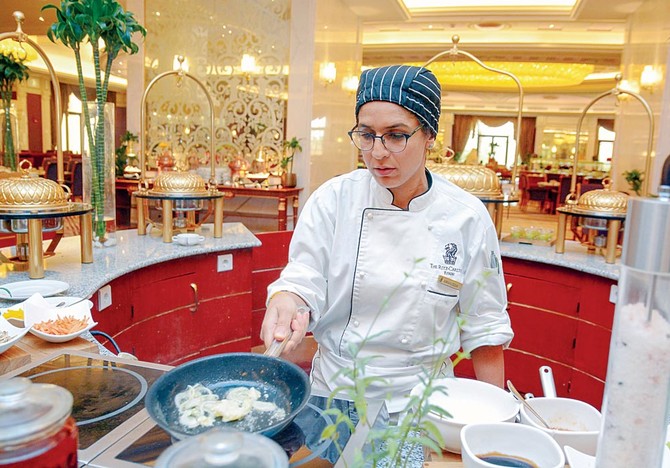RIYADH: In Riyadh’s Ritz-Carlton, one of the most renowned hotels in the world, Saudi female chefs have taken over the kitchen. Their mission? To show the world the true meaning of Arabian hospitality by delighting visitors’ palates. Traditional Saudi dishes are their specialty, but the cuisine is international, ranging from Italian to Chinese.
The chefs work in the hotel’s three restaurants: Hong, which features classic and modern Chinese cuisine; Azzurro, where fresh, seasonal ingredients are used to prepare classic Italian dishes with a modern twist; and Al Orjouan, an all-day dining buffet that serves a large brunch on Fridays.
In line with Vision 2030, the hotel opened its doors to female chefs two years ago, becoming one of the first hotels in the Kingdom to employ women in the kitchen. It now has 15 women chefs, with more on the way.
“The Ritz-Carlton, Riyadh is working in line with Saudi’s Vision 2030 in employing females in all departments of the hotel, culinary included,” said hotel manager Mohammed Marghalani. “However, we haven’t recruited them simply because they are women but because they are competent and excel in what they do, and that has always been our vision: To have a dedicated team of professionals that work together.”
Chef Al-Maha Al-Dossary, who grew up in Riyadh, was a corporate banker before deciding to pursue her dream of cooking. Her journey is one that will inspire others.
“Working at the bank was somewhat boring because it was routine. I would come back home, cook and bake. An epiphany hit me while cooking and doing what I love, and that was since I enjoy doing it so much, why don’t I make it my career? It was an impulsive decision, but one I don’t regret. If you do what you love, you will never work a day in your life.”
After deciding to advance her career as a chef, Al-Dossary graduated from Le Cordon Bleu culinary school in London. “I studied there for three years. In the beginning, I was sure that I wanted to be a pastry chef, but then I studied cuisine and I found the hot kitchen engaging and active.
“Once I returned from my studies, I applied at the Ritz because it’s an excellent hub to improve yourself, since we have exposure and engagement.”
The vegan chef, who enjoys a meat-free diet, is part of the Ritz-Carlton’s Voyager program, which prepares chefs to become managers. Al-Dossary said: “I began from the commissary, which receives food, and worked up to the Italian cuisine, going through all the stages of kitchen work and taking it step by step to learn the whole process.”
Al-Dossary hopes to open a chain of vegan restaurants in the future.
Sushi chef Habeeba Abdullah began cooking at the age of 11. She cooked her first full lamb with her uncle. “He kissed my forehead after we had completed the feast, and I felt a sense of pride. His encouragement helped pave the path of my culinary love, and his support made me feel I will be something big some day.”
Abdullah is a member of the Saudi Arabian Chefs Association, which offered her the chance to learn the art of making sushi, inviting her to a course in Jeddah. The week-long course gave trainees a sense that they were truly in Japan, she said, with Japanese chefs teaching her how to make sushi from scratch. “It was a new experience and I wanted to be a part of the new generation and prepare foods that they will enjoy.”
Asked about her ambitions, she said: “I aspired from the beginning, from cooking at home to cooking worldwide. I now consider myself (as if I were) working in the royal palace, which is the start of my launch to worldwide.”
Fadwa Al-Rumaih attributes her love of cooking to her upbringing. “My mother was my inspiration. Ever since I was young, we would cook together. The Ritz-Carlton gave me the chance to work in a world-renowned hotel and further my skills.” Saudi food is Al-Rumaih’s specialty, and she enjoys nothing more than seeing happy eaters who leave with a smile.
Chef Um Abdullah Al-Maliki said: “I cook with love. Cooking is my passion. I make breakfast in the morning for my kids. Then, after taking them to school, I cook at the hotel and come back once more to make a delicious meal for my family.”
Asked if she ever tires of the kitchen, since she basically spends all day in it, her reply was “never.”
“How can you get bored with your passion? I consider myself lucky that I get to do what I love, with love. No day goes without me being in the kitchen, whether at home or in the hotel. It’s my element and one that I feel most happy in,” she said.
One of the most challenging dining seasons is during Ramadan. Buffets are served after sundown until the sun comes up. It is the busiest time of year for these chefs — but also the most enjoyable.
“The happiness we feel when the serving dishes come back to kitchen empty is indescribable,” Al-Maliki said.
The demand was high, with the chefs serving more than 25 roasted lambs each day in Ramadan, along with more than 180 kilograms of rice.
“Ramadan usually is a stressful time for us because of the workload, but I can honestly say that it is the most memorable,” Al-Maliki said.
No food is wasted or thrown away, since the Ritz-Carlton has partnered with a charitable organization to distribute excess food to the needy throughout the year.
While interviewing the female chefs, I noticed a young male Saudi chef helping the women out. “We consider ourselves a family,” said Salah Al-Dien bin Taleb, a junior sous chef.
He has been at the Ritz for two years, and was surprised when the women joined.
“I must say that I was surprised by their persistence in doing a good job and their high work ethic. Even in the simplest of things, they are extremely detailed. Also, they do not restrict themselves to a certain cuisine. The sky’s the limit, and they are always determined to learn new things.”
“All of us have the same dream, which is to have Saudi cuisine featured internationally in restaurants worldwide. That is what we are working hard for,” said chef Reem Al-Saeed.
“Saudi Arabia is large, with many different regions that serve a vast variety of dishes. All tastes are satisfied, because of the large selection we have.”




















